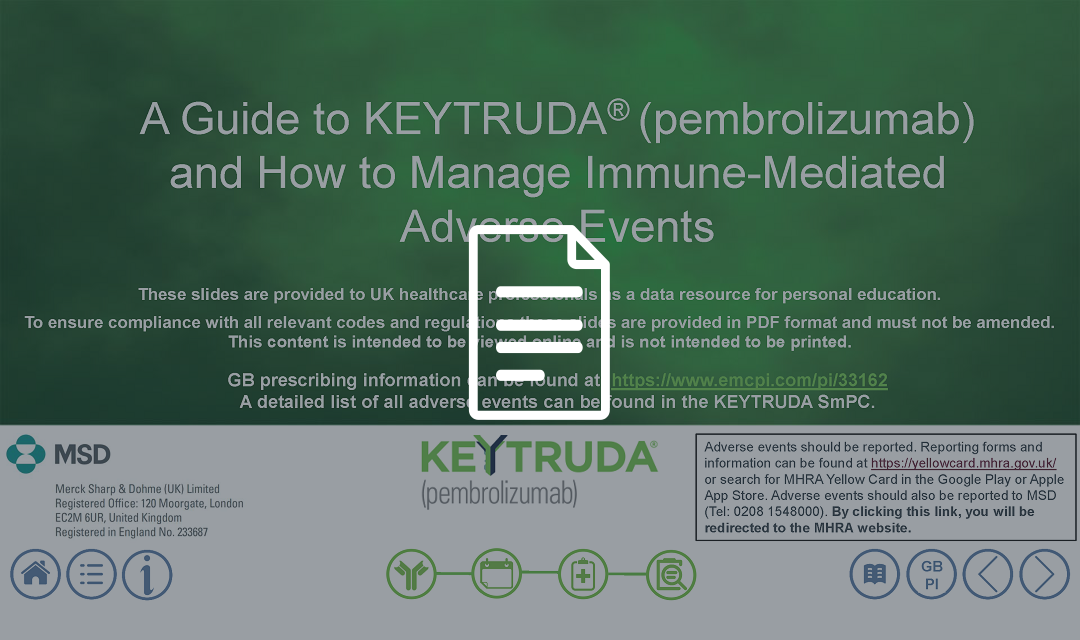Immuno-oncology (IO) treatment in first-line metastatic non-small cell lung carcinoma (mNSCLC) – a focus on KEYTRUDA (pembrolizumab) in patients with a PD-L1 expression of <1% through case studies (Case study 3/3)
Prescribing Information (Great Britain) & Prescribing Information (Northern Ireland) [External links]
This series of bite sized peer-to-peer videos by experienced clinical nurse specialists, specialist registrars and oncologists has been created to share their knowledge and experience of the day-to-day management of patients with mNSCLC treated with KEYTRUDA plus chemotherapy.
- KEYTRUDA as monotherapy is indicated for the first-line treatment of metastatic non-small cell lung carcinoma in adults whose tumours express PD-L1 with a ≥50% tumour proportion score (TPS) with no EGFR or ALK positive tumour mutations
- KEYTRUDA, in combination with pemetrexed and platinum chemotherapy, is indicated for the first-line treatment of metastatic non-squamous non-small cell lung carcinoma in adults whose tumours have no EGFR or ALK positive mutations
- KEYTRUDA, in combination with carboplatin and either paclitaxel or nab-paclitaxel, is indicated for the first-line treatment of metastatic squamous non-small cell lung carcinoma in adults
- KEYTRUDA as monotherapy is indicated for the treatment of locally advanced or metastatic non-small cell lung carcinoma in adults whose tumours express PD-L1 with a ≥1% TPS and who have received at least one prior chemotherapy regimen. Patients with EGFR or ALK positive tumour mutations should also have received targeted therapy before receiving KEYTRUDA
This module is CPD certified, offering a certificate upon completion.
Introduction
Please use the tabs below to navigate through this case study, please note you must complete all 3 case studies to receive the CPD certificate.
Upon watching all videos there are some questions for you to reflect on, which should take around 20 minutes.
We estimate the 3 case studies will take roughly an hour to complete, and upon completion (if logged in) a CPD certificate will become available and can be downloaded by clicking the final navigation tab on the last video. This certificate will also be sent to you via email to download.
Thank you for watching all the videos
We encourage you to digest the content in the videos by reflecting on the following questions. We estimate this should take around 20 minutes.
- How would you define an eligible mNSCLC patient for keytruda (pembrolizumab) combination treatment? does this change for a squamous or non-squamous patient?
- Does PDL-1 expression effect your decision process? after seeing the case studies, does this change your opinion?
- In your opinion, would the incidence of AE’s be any higher in the non-expresser pt grout versus a patient with PD-L1 >50%? How do you identify and manage adverse events when prescribing combination therapies?
- Considering any patients you or your colleagues have seen in the last 12 months, do the case studies reflect your experiences with IO plus chemo in patients with mNSCLC and PDL-1 <1%?
Shortly after you have finished reflecting, you will receive an email to access your CPD certificate. If you do not receive the certificate email within the next 24 hours please reach out to let us know.
Related content
References
- KEYTRUDA Summary of Product Characteristics.
Supporting documentation
Prescribing Information (Great Britain) & Prescribing Information (Northern Ireland)
By clicking the links above you will leave the MSD Connect website and be taken to the emc PI portal website.

